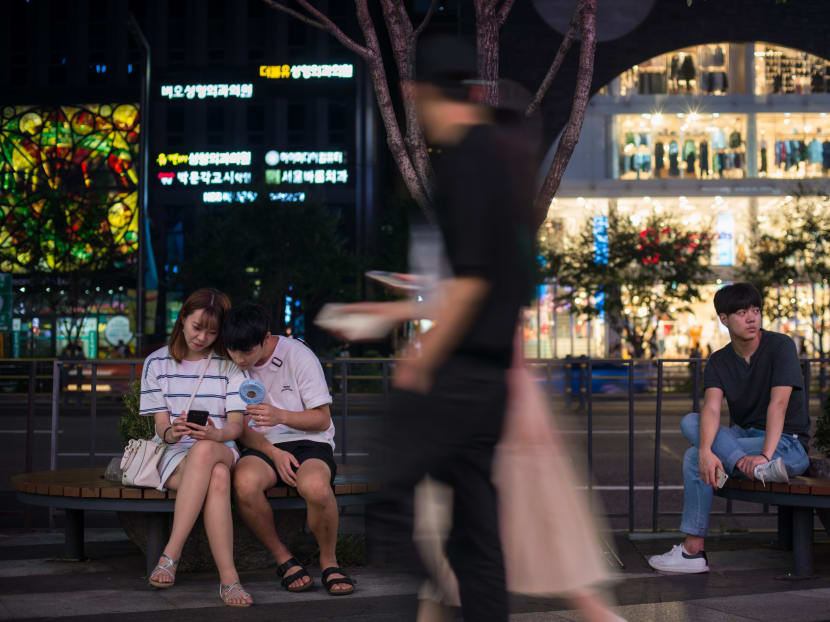In South Korea, ‘solo economy’ keeps growing
SEOUL — As the disco lights spin, the young woman belts out the final line of the song and the room falls silent. There is no applause.

With falling birth rates and rising divorce rates, South Korea is seeing an uptick in businesses focussing on solo consumers. This has had a ripple effect, with more people embracing time spent alone. Photo: Feline Lim
SEOUL — As the disco lights spin, the young woman belts out the final line of the song and the room falls silent. There is no applause.
Ms Lee Seung Hyun, 21, is alone at her weekly singing session at a coin noraebang — one of Korea’s ubiquitous pay-per-song karaoke booths.
“I like to visit the coin noraebang with friends, but at times I want to go alone because I can sing without waiting for other people,” says Ms Lee, a business student from Yonsei University.
With falling birth rates and rising divorce rates, South Korea is seeing an uptick in businesses focussing on solo consumers. This has had a ripple effect, with more people embracing time spent alone.
Karaoke cubicles like the one Ms Lee visited in Sinchon are peppered all over Seoul. A song typically costs 250 won (S$0.30).
Another popular entertainment option among singletons is comic book cafes.
For a small fee, visitors spend the night reading Korean comics known as manhwa. Many of these cafes are open 24 hours, and have cubby holes for people to sit back and enjoy a book in isolation.
But the convenience store industry is the brightest spot in the growing solo economy.
By default, convenience stores specialise in single-serving, ready-to-go food and drinks that are obvious choices for the lone consumer.
According to the Korea Association of Convenience Store Industry, total sales in 2016 was 20.4 trillion won (S$25.45 billion), up 18.6 per cent from the previous year.
Associate professor of sociology at Harvard University Paul Chang explains that Korean society is moving away from the herd mentality and towards individual pursuits of happiness.
This has created economic growth powered by the solo consumer. “The proportion of one-person households is so large that it has become a significant part of the market,” he said.
“And businesses are obviously reacting to it. There’s even a whole new language coined around this phenomenon.”
The acts of eating and drinking alone are known as honbap and honsul respectively, and they have become increasingly popular in the country’s conventionally communal culture.
MORE ONE-PERSON HOUSEHOLDS
This swing towards the solo lifestyle is also apparent in the housing market.
The Korea Institute for Health and Social Affairs (KIHASA) estimated the number of one-person households to be 5.06 million in 2015, an almost eight-fold increase from 661,000 in 1985. By 2035, it is expected to become the most common type of household.
Kim Eun Jin, 39, market researcher at Real Estate 114, says that the government recognises the surge in single-person households and has set aside 20 per cent of public rental housing for those who live alone.
Ms Kim notes that the high cost of owning a house is a great deterrent to many Koreans.
As such, more are choosing to rent homes alone, postponing marriage and sometimes even rejecting the idea entirely.
A report in June by Korean matchmaking firm Duo said the average ages of men and women at the time of their first marriage have risen significantly over the past decade, from 33.4 and 30.7 to 36 and 33 respectively.
Mr Kim Jong Geon, 56, team leader of the welfare policy division in Seoul’s Gangdong district says: “People are choosing to stay alone because it is difficult to get married if you aren’t financially stable. Moreover, it is increasingly hard to achieve that in the current economy.
Cultural forces such as rigid gender roles within the family are pushing many highly-educated women towards the solo life, away from marriage in pursuit of their careers.
“For men, there is also a greater expectation to cover the housing cost,” says Prof Chang.
He says this makes it especially difficult for men in the lower and middle income bracket. “They simply give up on the whole idea.”
One such bachelor is Mr Choi Jun Ho. The 32-year-old lives alone in a 40 sqm rental apartment in Gangnam, Seoul, and has been on his own since 2003 when he left his hometown of Gwangju.
He admits that he would like to get married someday, but says now is not the time as he is not ready to bear the financial costs of starting a family.
For now, Mr Choi is enjoying the freedom that comes with a solo lifestyle.
“Living alone can be quite nice. The best part of it is the freedom — to bring home a girlfriend or to host guests,” he says.
The former brand manager wants to pursue his master’s degree in fashion retail management in London.
“I wouldn’t be able to do all of these things if I were married or had children. They would be a burden,” he says.
Feline Lim, a final-year journalism student at Nanyang Technological University’s Wee Kim Wee School of Communication and Information, did this report as part of the school’s Going Overseas For Advanced Reporting module. This is the final piece in a series on South Korea that TODAY is running.









